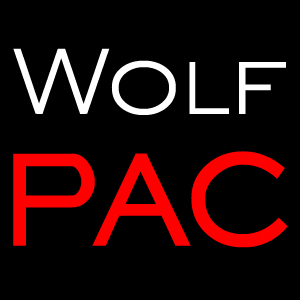
Campaign finance laws in the United States have been a contentious political issue since the early days of the union. The most recent major federal law affecting campaign finance was the Bipartisan Campaign Reform Act (BCRA) of 2002, also known as "McCain-Feingold". Key provisions of the law prohibited unregulated contributions to national political parties and limited the use of corporate and union money to fund ads discussing political issues within 60 days of a general election or 30 days of a primary election; However, provisions of BCRA limiting corporate and union expenditures for issue advertising were overturned by the Supreme Court in Federal Election Commission v. Wisconsin Right to Life.
Corporate personhood or juridical personality is the legal notion that a juridical person such as a corporation, separately from its associated human beings, has at least some of the legal rights and responsibilities enjoyed by natural persons. In most countries, a corporation has the same rights as a natural person to hold property, enter into contracts, and to sue or be sued.

A popular initiative is a form of direct democracy by which a petition meeting certain hurdles can force a legal procedure on a proposition.
Santa Clara County v. Southern Pacific Railroad Company, 118 U.S. 394 (1886), is a corporate law case of the United States Supreme Court concerning taxation of railroad properties. The case is most notable for a headnote stating that the Equal Protection Clause of the Fourteenth Amendment grants constitutional protections to corporations.
In law, a legal person is any person or legal entity that can do the things a human person is usually able to do in law – such as enter into contracts, sue and be sued, own property, and so on. The reason for the term "legal person" is that some legal persons are not people: companies and corporations are persons legally speaking, but they are not people in a literal sense.
A constitutional amendment is a modification of the constitution of a polity, organization or other type of entity. Amendments are often interwoven into the relevant sections of an existing constitution, directly altering the text. Conversely, they can be appended to the constitution as supplemental additions, thus changing the frame of government without altering the existing text of the document.
An entrenched clause or entrenchment clause of a constitution is a provision that makes certain amendments either more difficult or impossible to pass. Overriding an entrenched clause may require a supermajority, a referendum, or the consent of the minority party. The term eternity clause is used in a similar manner in the constitutions of Brazil, the Czech Republic, Germany, Greece, India, Iran, Italy, Morocco, Norway, and Turkey, but specifically applies to an entrenched clause that can never be overridden. However, if a constitution provides for a mechanism of its own abolition or replacement, like the German Basic Law does in Article 146, this by necessity provides a "back door" for getting rid of the "eternity clause", too.
In the politics of the United States, the process of initiatives and referendums allow citizens of many U.S. states to place legislation on the ballot for a referendum or popular vote, either enacting new legislation, or voting down existing legislation. Citizens, or an organization, might start a popular initiative to gather a predetermined number of signatures to qualify the measure for the ballot. The measure is placed on the ballot for the referendum, or actual vote.
The Program on Corporations, Law, and Democracy (POCLAD) is an activist collective of 11 members, who research the history of corporations in the United States. They are some of the main circulators of the notion that corporate personhood—which gives corporations some of the same legal rights as real human beings—is at the center of the problems regarding corporations. They also publish a newsletter three times a year called By What Authority English for quo warranto, a legal phrase that questions illegitimate exercise of privilege and power, which they claim reflects an unabashed assertion of the right of the sovereign people to govern themselves.
A convention to propose amendments to the United States Constitution, also referred to as an Article V Convention, state convention, or amendatory convention is one of two methods authorized by Article Five of the United States Constitution whereby amendments to the United States Constitution may be proposed: on the Application of two thirds of the State legislatures the Congress shall call a convention for proposing amendments, which become law only after ratification by three-fourths of the states. The Article V convention method has never been used; but 33 amendments have been proposed by the other method, a two-thirds vote in both houses of Congress; and 27 of these have been ratified by three-fourths of the States. Although there has never been a federal constitutional convention since the original one, at the state level more than 230 constitutional conventions have assembled in the United States.

The National initiative is a proposed process to petition an initiative at the federal level in the United States via a national vote on the national ballot measure. While some U.S. states allow direct or indirect initiatives, there are currently no national initiatives in the United States.
Electoral reform in the United States refers to the efforts of change for American elections and the electoral system used in the US.
Citizens United v. Federal Election Commission, 558 U.S. 310 (2010), is a landmark decision of the Supreme Court of the United States regarding campaign finance laws and free speech under the First Amendment to the U.S. Constitution. The court held 5–4 that the freedom of speech clause of the First Amendment prohibits the government from restricting independent expenditures for political campaigns by corporations including for-profits, nonprofit organizations, labor unions, and other kinds of associations.
Personhood is the status of being a person. Defining personhood is a controversial topic in philosophy and law and is closely tied with legal and political concepts of citizenship, equality, and liberty. According to law, only a legal person has rights, protections, privileges, responsibilities, and legal liability.

Wolf-PAC is an American nonpartisan political action committee formed in 2011 with the goal of adding an "amendment to the United States Constitution to ensure balance, integrity, and transparency to our national system of campaign finance".
A campaign finance reform amendment refers to any proposed amendment to the United States Constitution to authorize greater restrictions on spending related to political speech, and to overturn Supreme Court rulings which have narrowed such laws under the First Amendment. Several amendments have been filed since Citizens United v. Federal Election Commission and the Occupy movement.
Hale v. Henkel, 201 U.S. 43 (1906), was a major United States Supreme Court case in which the Court established the power of a federal grand jury engaged in an investigation into corporate malfeasance to require the corporation in question to surrender its records.

American Promise is a national, non-profit, non-partisan, grassroots organization that advocates for a 28th Amendment to the United States Constitution that would allow the U.S. Congress and states to set reasonable limits on campaign spending in U.S. Elections. Founded in 2016 by Jeff Clements, the former assistant attorney general of Massachusetts, and author of Corporations Are Not People: Reclaiming Democracy From Big Money and Global Corporations, American Promise advocates for campaign finance reform in the United States.
Ellen Read is a New Hampshire politician. She is a Democratic member of the New Hampshire House of Representatives.





